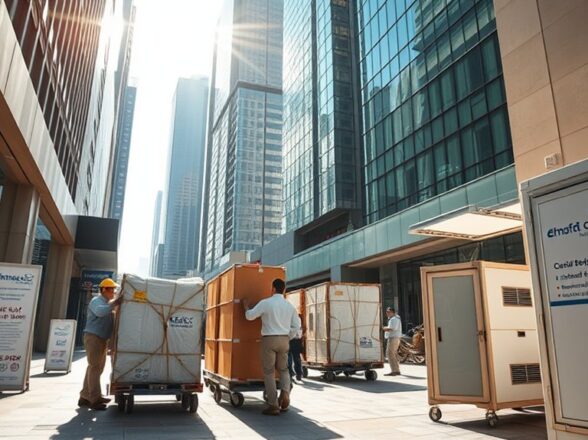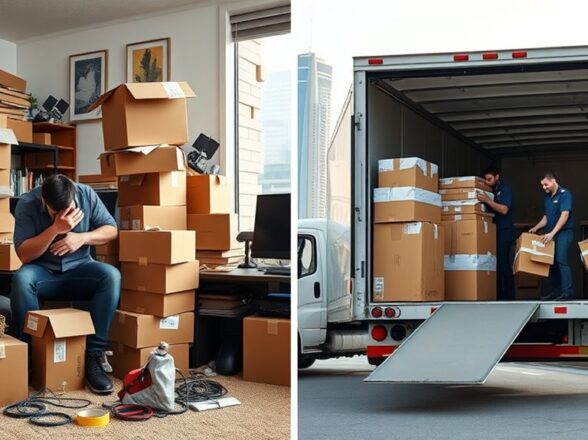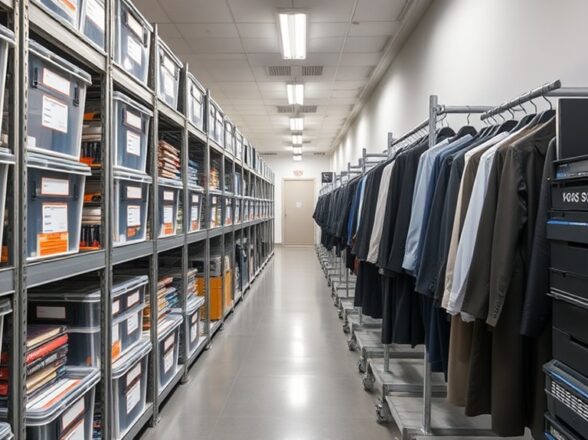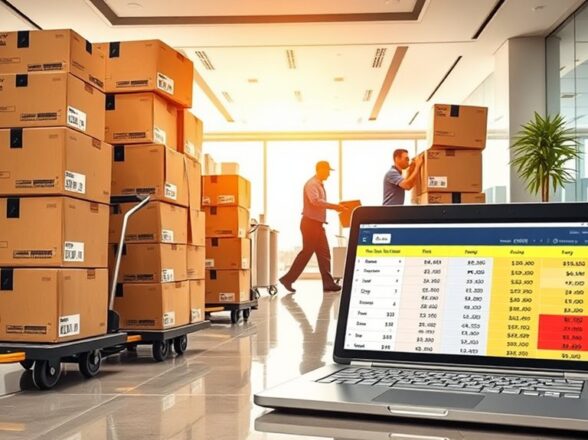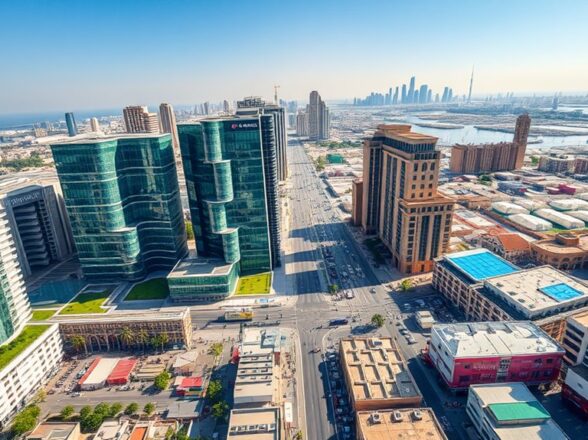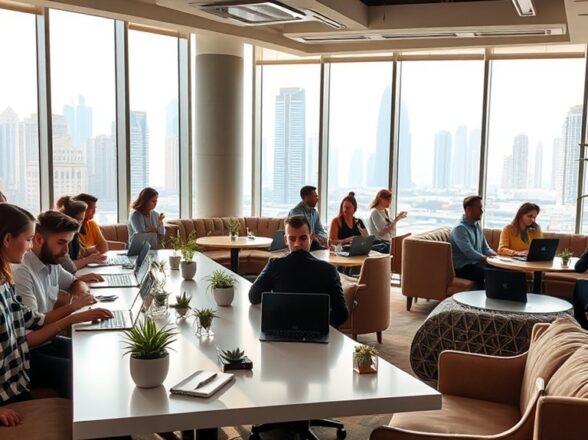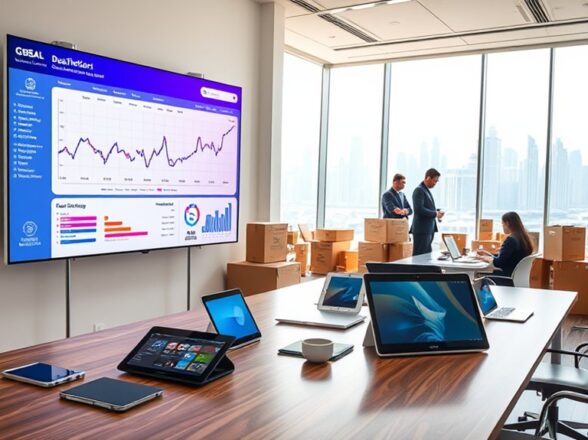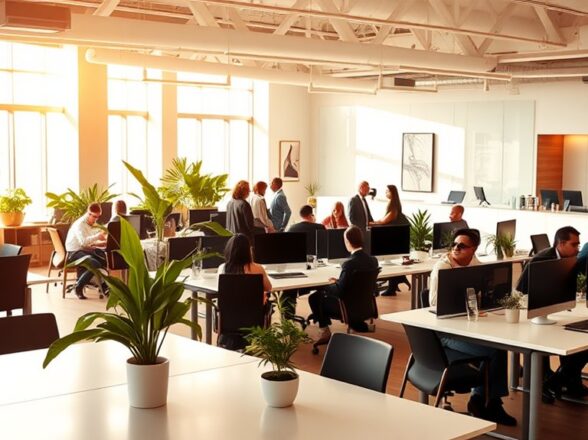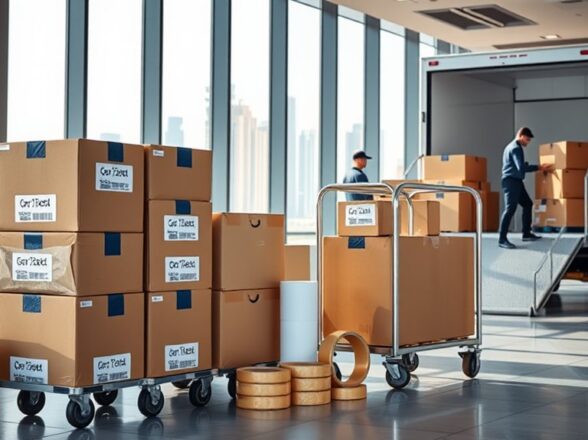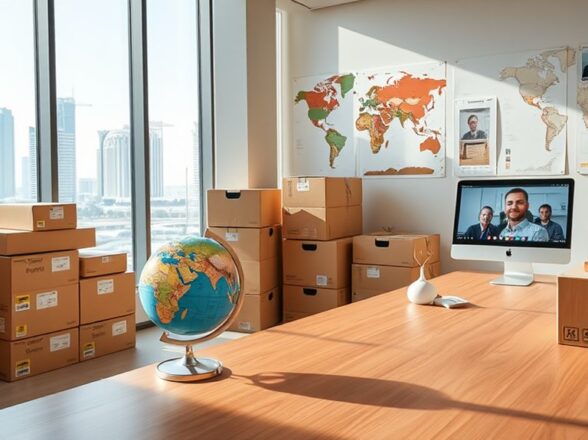The Psychology of Office Relocation: How to Support Employee Well-Being in Dubai
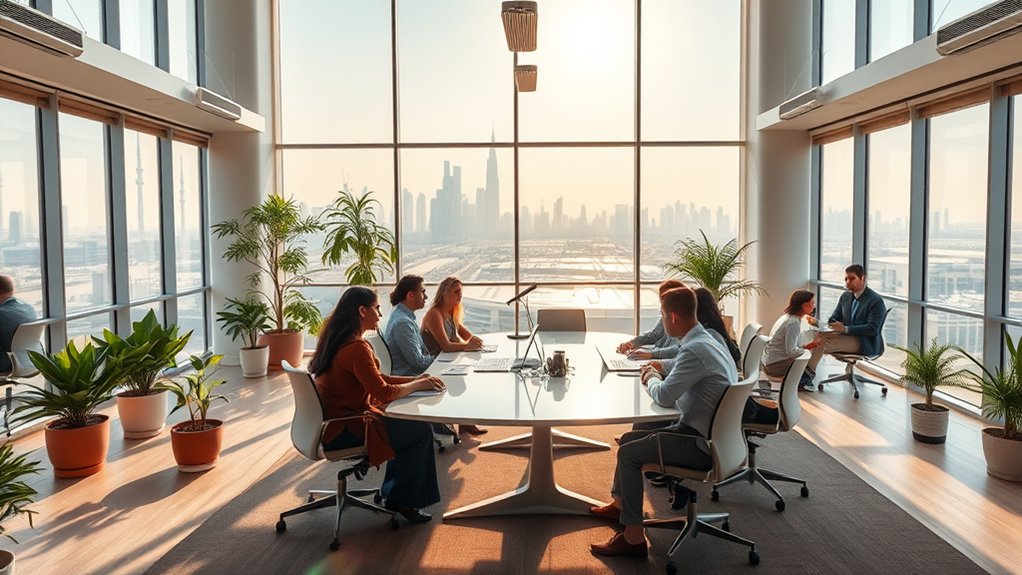
When relocating your office in Dubai, it’s essential to prioritize employee well-being. Start by communicating early about the move to reduce anxiety. Offer flexible work arrangements to ease changes, and organize team-building events to strengthen connections. Consider providing access to mental health resources like Employee Assistance Programs (EAPs) and workshops. Guarantee your new space is ergonomic and fosters collaboration to boost morale. Recognizing achievements during this process can enhance team spirit. By implementing these strategies, you can support your employees and minimize stress throughout the change, making it easier for everyone to adapt as they move forward. Moreover, it’s vital to gather feedback from employees regarding their relocation experiences, as this can highlight areas for improvement and foster a sense of inclusion. Training sessions on how to motivate employees in relocation can also be beneficial, equipping managers with effective techniques to uplift their teams. By actively involving employees in the transition process, you not only enhance their engagement but also create a positive workplace culture that thrives in new environments.
Key Takeaways
- Early communication about the relocation reduces anxiety and helps employees feel in control of the transition process.
- Implementing flexible work arrangements minimizes stress during the relocation, allowing for a smoother adjustment period.
- Providing access to mental health resources, like Employee Assistance Programs, supports employees in coping with relocation-related challenges.
- Designing ergonomic and collaborative workspaces enhances comfort and fosters a sense of community, improving overall employee engagement and productivity.
- Recognizing and celebrating team achievements during the transition promotes morale and strengthens team cohesion amidst changes.
Impact of Office Relocation

When you think about office relocation, it's clear that the impact on employee well-being can be significant. Studies show that a staggering 14% of the UAE population faces mental disorders, and many don't seek help during stressful changes like moving offices. Increased stress and anxiety can arise during relocations, which often lead to decreased productivity. In fact, the UAE loses AED 3.9 billion annually due to mental health-related productivity losses.
As employees navigate the uncertainties and instability of a new workplace, they may feel isolated, especially if their established social networks are disrupted. This isolation can exacerbate their mental health challenges unless companies take proactive steps, such as organizing team-building events, to foster connection among team members. Additionally, understanding the navigational challenges of moving within Dubai’s unique landscape can help mitigate some of the stress associated with office relocations. Utilizing professional relocation services can also streamline the moving process, providing employees with a smoother transition and reducing potential anxiety. Moreover, companies can enhance the overall experience by incorporating the latest trends in the evolution of office relocation services, which focus on employee well-being and adaptation. By investing in tailored support that addresses both the logistical aspects of moving and the emotional needs of employees, businesses can create a more resilient workforce. This kind of holistic approach not only eases the transition but also fosters loyalty and engagement among team members, ultimately benefiting the organization as a whole.
Importance of Communication
Effective communication is essential during an office relocation, as it helps alleviate the stress and uncertainty employees often feel about such changes. Early notification about the move is imperative; it allows you to prepare mentally and logistically, reducing anxiety. When you're informed ahead of time, it fosters a sense of control over the situation.
Utilizing multiple communication methods, like one-on-one meetings and written updates, guarantees that everyone receives timely and clear information. This approach helps you understand the relocation process and its benefits, making the change smoother. It's also essential to provide a dedicated channel for your inquiries. Having a space where you can voice concerns helps address issues promptly and fosters a sense of inclusion in the change.
Regular updates about the relocation timeline are equally important. They keep you informed and engaged, which can greatly reduce anxiety linked to uncertainty. When you know what's happening and when, you can plan accordingly and feel more at ease. Additionally, involving experienced staff trained in handling commercial equipment can enhance the relocation process by ensuring that all aspects are managed efficiently.
Furthermore, sharing success stories from previous relocations can motivate and reassure you. Hearing about positive outcomes from past moves illustrates that change can lead to beneficial results, enhancing your buy-in for the current change. By prioritizing communication throughout the relocation process, you not only support your well-being but also create a more cohesive and resilient workplace culture. Remember, effective communication is the backbone of a successful office relocation.
Furthermore, understanding the role of logistics in office moving can help you appreciate the complexities involved and the efforts made to ensure a seamless transition.
Employee Feedback Mechanisms

How can you guarantee your voice is heard during an office relocation? One effective way is to engage in employee feedback mechanisms like surveys and focus groups. These tools allow you to express your concerns and preferences, fostering a sense of ownership in the relocation process. When you share your thoughts, it not only helps shape the new office environment but also enhances your overall employee wellbeing. Additionally, involving professional movers can contribute to a smoother transition, allowing you to focus on providing feedback without the stress of logistics and packing efficient time management. Moreover, it’s essential to stay informed about the relocation timeline and key decisions being made, which can further reduce anxiety and uncertainty among employees. Consider participating in question-and-answer sessions with management to clarify any doubts and voice any lingering concerns. By actively engaging in these discussions, you can contribute valuable insights that align with office relocation tips and strategies, ultimately ensuring that the move reflects everyone’s needs and preferences.
Regular assessments of the feedback you provide post-relocation can help your organization monitor well-being metrics. This ongoing dialogue guarantees that any issues affecting your satisfaction and productivity are identified and addressed. By voicing your opinions on the new office layout and amenities, you contribute to creating a more comfortable and tailored workspace that enhances collaboration and workflow.
Active involvement in decision-making reduces anxiety and resistance to change. When you know your input matters, it boosts morale and engagement during the change. Establishing clear communication channels for feedback, such as dedicated inquiry platforms or suggestion boxes, promotes transparency. This reassures you and your colleagues that your voices are valued throughout the relocation process. Additionally, engaging in employee feedback mechanisms can ensure that the relocation process aligns with the overall strategy and goals of the organization.
Strategies for Flexibility
As you navigate the complexities of an office relocation, embracing flexibility can make a world of difference. Offering flexible working hours during this change can greatly reduce stress and help you balance personal commitments. By allowing employees to adjust their schedules, you foster a smoother move to the new office environment.
Implementing remote work options temporarily can also be beneficial. This approach lets employees acclimate to new responsibilities without the added pressure of commuting. It enhances overall well-being and shows you're committed to their mental health. Recognizing the need for personal time during this period not only promotes loyalty but also increases satisfaction within the workforce.
Consider gradual changes, like phased movements or staggered start dates. These strategies can mitigate feelings of overwhelm and allow employees to adjust at their own pace. Flexibility in reporting times for long-distance moves can also accommodate family adjustments, ensuring everyone feels supported throughout the relocation journey.
Resources for Mental Health
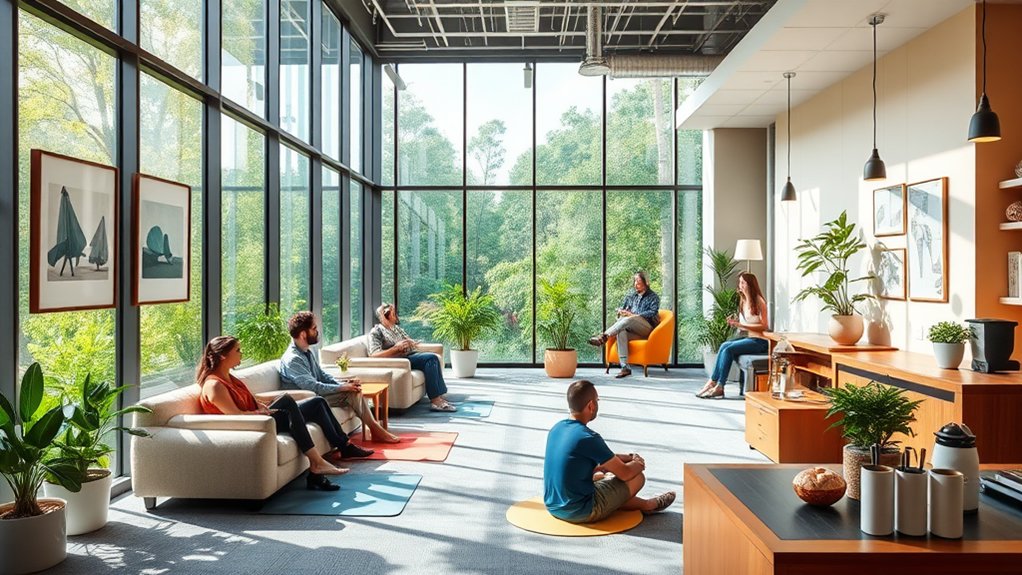
Finding the right resources for mental health support during an office relocation can greatly ease the shift for employees. In Dubai, Employee Assistance Programs (EAPs) offer accessible psychology and counseling services in multiple languages, ensuring everyone gets the support they need. By collaborating with local mental health facilities like Camali Clinic, organizations can provide employees with preferential treatment and priority consultations for therapy and psychiatry, enhancing their overall mental health and wellbeing.
Consider implementing mental health training workshops that equip your team with skills to identify early warning signs of mental health issues. These workshops also provide strategies to cope with stress and anxiety, fostering a more supportive work environment. Additionally, support groups tailored for different demographics, such as working women and parents, can facilitate open discussions and connections, helping alleviate feelings of isolation during this change.
For those adapting to remote work, resources and strategies emphasizing structured routines and effective communication are essential. They help maintain productivity while prioritizing mental health and wellbeing in a flexible environment. Encouraging employees to establish daily schedules, check-in regularly, and promote healthy work-life boundaries can greatly contribute to their mental health.
Designing a Supportive Workplace
When designing your new office, think about incorporating ergonomic furniture to boost comfort and prevent injuries. You'll also want to create collaborative areas that encourage teamwork and creativity among employees. By focusing on these elements, you can foster a supportive workplace that enhances well-being and productivity.
Ergonomic Workspace Design
Creating an ergonomic workspace is essential for enhancing employee comfort and productivity. By prioritizing ergonomic design, you can markedly reduce the risk of musculoskeletal injuries, which in turn supports overall wellbeing. Studies show that implementing proper ergonomics can lead to a 25% increase in efficiency.
Incorporating adjustable furniture, like sit-stand desks, allows employees to switch postures throughout the day, boosting energy levels and reducing fatigue. Natural light is another critical element; it not only lifts mood but also increases alertness. Research indicates that employees in well-lit environments report a 15% higher satisfaction rate.
Moreover, diverse workspaces are fundamental. By providing quiet areas for focused work alongside collaborative zones, you enhance employee engagement and creativity. Findings suggest that 65% of employees feel more productive in varied work settings.
Finally, integrating wellness rooms and recreational spaces fosters relaxation and mental wellbeing, which is important since 75% of individuals needing mental health support don't seek help. By designing an ergonomic workspace, you're not just supporting comfort—you're investing in the overall success and happiness of your employees.
Collaborative Areas Creation
How can designing collaborative areas transform your workplace dynamics? By creating spaces that encourage interaction, you foster a sense of community that boosts job satisfaction, especially in the fast-paced environment of Dubai. Diverse workspaces, including quiet zones and recreational areas, can address varying needs while promoting productivity and reducing stress during office relocation.
Research shows that well-designed collaborative spaces can lead to a 20% increase in employee engagement. This change period is vital, and thoughtful design can greatly support the mental health of your team. Utilizing color psychology in these areas positively influences mood and creativity, essential for innovation.
Moreover, incorporating ergonomic furniture and ensuring ample natural light in collaborative spaces can reduce workplace injuries and enhance overall well-being. By prioritizing these elements, you create a healthier and more supportive environment post-relocation.
Work-Life Balance Initiatives

As you navigate the challenges of an office relocation, flexible work arrangements can greatly ease your shift. Recognizing the importance of personal time not only helps you manage your commitments but also shows that your well-being is a priority. By embracing these initiatives, you can maintain a healthier work-life balance during this period of change.
Flexible Work Arrangements
While relocating can bring excitement, it often comes with considerable stress, making flexible work arrangements essential for maintaining employee well-being. Offering options like remote work and adjusted reporting times allows you to manage personal commitments effectively, reducing the pressure during this shifting period. Research shows that flexibility in work hours can greatly boost your satisfaction and productivity, especially when maneuvering through the challenges of relocation.
Implementing policies that promote work-life balance not only enhances your job satisfaction but also fosters loyalty. In fact, 75% of employees prioritize flexibility when considering their overall happiness at work. By creating a culture that values flexibility, companies can reduce burnout rates and improve mental well-being. This is vital as you face the emotional and logistical hurdles of moving into a new office environment.
Providing gradual adjustments and accommodating arrangements helps you cope with the stress associated with relocation. Ultimately, these strategies lead to a smoother adaptation process for you and your colleagues, enhancing not just individual mental well-being but the overall work atmosphere. Embracing flexible work arrangements can make a considerable difference for everyone during this exciting yet challenging time.
Personal Time Recognition
Recognizing personal time during office relocations is essential for maintaining employee well-being, especially when research shows that many people face heightened stress and anxiety during such changes. By prioritizing work-life balance initiatives, you can greatly support your employees' mental health during this shifting period.
Consider offering flexible working hours and remote work options. This flexibility allows employees to manage their personal commitments while adapting to new environments, fostering a sense of control that can alleviate anxiety. When employees feel their personal time is respected, satisfaction and retention rates increase, creating a more loyal workforce.
Implementing gradual shifts into new workspaces can also help reduce stress. Providing employees with the time they need to acclimate can enhance productivity and ease the adjustment process. Additionally, promoting a culture that values personal time not only aids in employee adjustment but also benefits long-term organizational performance.
Ultimately, recognizing personal time during relocations is a powerful way to prioritize your employees' mental health. By investing in their well-being, you create a supportive environment that empowers employees to thrive at work and beyond.
Training and Development Support
Training and development support plays an essential role during office relocations, ensuring you and your colleagues can adapt quickly to new environments. This support not only helps employees settle into their new surroundings but also enhances productivity during the shift. Here are some effective strategies you can implement:
- Training on New Technology: Providing training on new tools and technologies relevant to the new office environment will help employees adapt smoothly, ensuring they can perform at their best from day one.
- Workshops for Resilience: Organizing workshops that focus on adapting to change and building resilience can equip you and your colleagues with essential skills to manage the emotional challenges of relocation.
- Mentorship Programs: Establishing mentorship programs pairs employees with experienced colleagues, allowing for guidance through the relocation process and the adjustment to new work dynamics.
- Knowledge-Sharing Sessions: Facilitating knowledge-sharing sessions encourages collaboration among teams, ensuring everyone is well-versed in the new workplace culture and expectations.
Celebrating Successes Together

Celebrating team achievements during the relocation can really boost morale and foster a sense of belonging. By hosting events to recognize efforts and milestones, you not only show appreciation but also strengthen connections among colleagues. These moments of celebration are essential for building a positive workplace culture in your new environment.
Recognizing Team Achievements
When you take the time to acknowledge team achievements during an office relocation, you not only boost morale but also strengthen the sense of community among employees. Recognizing these milestones plays an essential role in enhancing support systems within your organization. Here are four effective ways to celebrate successes together:
- Celebrate Milestones: Acknowledge key achievements, like completing the move or meeting project deadlines, to reinforce team cohesion.
- Host Team Lunches: Organize informal gatherings where team members can share their contributions and experiences, fostering collaboration in the new environment.
- Implement Recognition Programs: Establish structured programs to consistently highlight individual and team efforts, cultivating a culture of appreciation.
- Share Success Stories: Create platforms for employees to share their unique contributions, validating their efforts and motivating others.
All these practices not only enhance job satisfaction but also promote a positive atmosphere during potentially stressful times. By recognizing team achievements, you create a supportive workplace that encourages engagement and reduces turnover, ultimately improving overall organizational performance post-relocation. Remember, a connected team is a productive team!
Hosting Celebration Events
Although relocating an office can be a challenging experience, hosting celebration events can greatly enhance employee morale and foster a sense of community. These events allow you to acknowledge the hard work put in during the relocation and reinforce a culture of appreciation. By organizing team-building activities, you not only strengthen relationships but also improve productivity in the new workspace.
Here's a quick look at how celebration events can benefit employee mental health:
| Benefit | Description | Impact on Morale |
|---|---|---|
| Sense of Community | Build connections among employees | High |
| Acknowledgment | Recognize efforts and hard work | Very High |
| Team-Building Activities | Foster collaboration and teamwork | High |
| Stress Relief | Provide food and fun to alleviate relocation stress | Very High |
| Ongoing Motivation | Plan milestones throughout the process | High |
Long-Term Well-Being Strategies
To enhance long-term employee well-being during and after an office relocation, organizations must adopt a multifaceted approach that prioritizes mental health and support systems. Implementing effective long-term well-being strategies is essential for fostering a positive work environment. Here are some key actions you can take:
- Comprehensive Employee Assistance Programs (EAPs): Provide ongoing mental health support, including counseling services in multiple languages, to cater to Dubai's diverse workforce. This guarantees that employees feel understood and supported.
- Workshops on Stress Management: Regularly conduct workshops focusing on stress and anxiety management. Equip employees with practical techniques to enhance emotional resilience, helping them navigate the challenges of relocation.
- Flexible Working Arrangements: Offer flexible working options during the changeover period. This allows employees to balance work and personal commitments, reducing stress and promoting overall well-being.
- Open Discussions About Mental Health: Create a supportive work environment that encourages open dialogue about mental health. By fostering psychological safety, you'll improve productivity and job satisfaction among employees.
Frequently Asked Questions
How Do You Best Support the Psychological Well-Being of Staff?
To best support the psychological well-being of your staff, focus on building mental resilience. Encourage open communication, allowing employees to share their concerns and feelings. Implement stress management workshops and provide access to counseling services, so they feel supported. Create opportunities for team bonding, which can strengthen relationships and reduce feelings of isolation. Additionally, involve them in decision-making processes, fostering a sense of ownership and security during changes.
How to Promote Emotional Wellbeing at Work?
To promote emotional well-being at work, you can incorporate mindful practices into your daily routine. Start by encouraging short mindfulness breaks, where you and your colleagues can recharge and focus on the present moment. Organizing workshops on stress management and emotional resilience can foster a supportive culture. Additionally, openly discussing mental health and providing access to resources like Employee Assistance Programs can help create an environment where everyone feels safe to express their concerns.
What Do Employees in Psychologically Healthy Workplaces Experience?
They say a happy workplace is a productive workplace. In a psychologically healthy workplace environment, you experience higher job satisfaction and feel valued. You're more likely to communicate openly about challenges, knowing support's available. This culture fosters loyalty, reducing absenteeism and turnover. With access to mental health resources, you build resilience and learn coping strategies, leading to lower burnout rates and increased engagement. Ultimately, you thrive, contributing positively to the organization's success.
What Is Emotional Well-Being in the Workplace?
Emotional well-being in the workplace means you can manage your emotions and cope with stress effectively. It's essential for fostering employee resilience, as it helps you maintain a positive outlook amidst challenges. When you feel supported, your job satisfaction and productivity improve. Organizations that prioritize emotional well-being create environments where you can openly discuss your feelings, ultimately enhancing your overall performance and reducing absenteeism. It's about feeling safe and valued at work.
Conclusion
As you navigate the challenges of office relocation in Dubai, remember that supporting your team's well-being is key. By fostering open communication, gathering feedback, and offering flexible strategies, you can create a positive environment. Don't forget to prioritize mental health resources and work-life balance initiatives. When you celebrate successes together, you'll not only boost morale but also strengthen your team's bond. In the end, a happy team is the backbone of a thriving workplace.
Related posts
Recent posts
Post Categories
Tags
Subscribe



